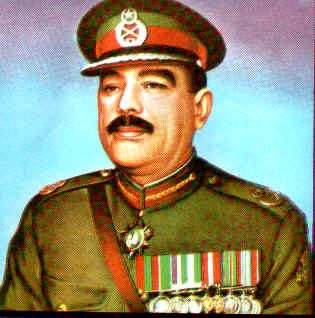 |
|
Field
Marshal Muhammad Ayub Khan |
Ayub Khan joined Royal
Military College in Sandhurst and got commissioned in the Indian army in
1928.
After independence, he joined the Pakistan Army. In 1951 Ayub Khan
was promoted to a full General and Commander-in-Chief of the army. As
Commander-in-Chief he played a key role in negotiations concerning
Pakistan's entry into US sponsored military alliances. He also served as
the Defense Minister in Muhammad Ali Bogra's "ministry of all
talents" in 1954-55.
General Ayub Khan took over the power when he removed President
Iskander Mirza in October 1958. He had earlier imposed martial-law and
had abrogated the constitution. Later on he gave himself the rank of
Field Marshall.
During his rule, Basic Democracy was introduced along with indirect
elections. The 1962 constitution also gave extraordinary powers to the
President. After the imposition of the 1962 constitution, Field Marshal
Ayub became the second President of the country. He won the 1965
elections, however, he could not complete his term.
During his term, the "Great Decade" was celebrated in 1968,
which highlighted the development work executed during ten years of
Ayub's rule. The 1965 war was fought during Ayub's term and Ayub Khan
represented Pakistan in the subsequent Tashkent talks.
In November 1968, widespread protests broke out against Ayub's rule,
who had to hand over power to General Yahya Khan. Ayub Khan resigned in
March 1969.
.
|